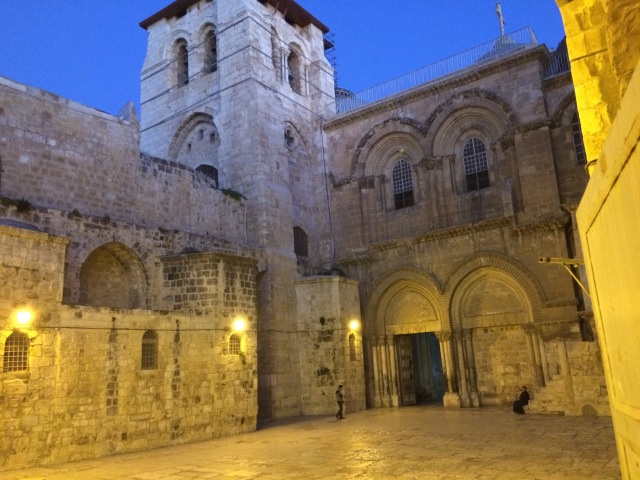

You may have wondered why an execution is known as, “Good” Friday.
Here is the spoiler: Jesus went to the cross to be able to say three words: “It. Is. Finished.”
The early church believed Jesus was crucified on March 25th. Further, they believed that, since re-creation happened on March 25th, the first day of creation must have happened that day as well.
The early Christian’s view of time was much loftier than the later idea that time revolves around, Anno Domini, “the year of our Lord.” The original idea of Jesus’ followers was that the cross of Christ is the Axis Mundi, a timeless, still center to the universe around which the entire cosmos rotates. It wasn’t that the earth was the center of the universe. It was that the cross is.
I was a Young Life leader for 25 years. Young Life focusses on explaining Jesus to the high school kids who don’t go to church. Every semester YL leaders do a talk on the crucifixion. One Monday night 140 high school kids were shoehorned into my friend Rawleigh Grove’s living room as I gave the “cross talk.” Regardless of what you have heard of high school kids interest in the things of God, I can tell you that all over the globe hundreds of thousands of high school kids are hanging on every word of the story of Jesus’ crucifixion at Young Life clubs. After that message kids sat in stunned silence. Except for one kid, a church kid named Josh. Josh jumped up, ran right up to my nose and said, “I’ve been in church my whole life and I have NEVER heard this. My dad was a youth pastor, my mom a Sunday school teacher, but I’ve never heard this. Why has no one has EVER told me this?”
Without thinking I said, “Maybe the church is so busy telling kids what not to do that we forget to tell you what Jesus did.” That was, it turns out, a pretty good answer. But Josh misses my accidental brilliance, “I don’t know about that.” He turns and practically runs out the door saying, “I’m going Starbucks.” He rips open my friend’s front door and yells over his shoulder, “It’s the only place still open. I have to tell someone what Jesus did for them!” The door slams and Josh is gone.
…For the first time Josh knew what Jesus did on the cross in detail. And for the first time, Josh knew that Jesus did it to satisfy a debt that only God could pay…Josh’s world began to pivot around a new axis: the immovable cross of Jesus Christ.
Centuries before Jesus lived, Isaiah passed along (in Isaiah 52 and 53) what God told us Jesus would someday do – why he would go to the cross. In John 19:30 Jesus tells us how it panned out – “It is finished.”
Notice that Jesus didn’t say, “I am finished.” He didn’t say, “Oops.” He didn’t say, “three cheers for the attempt.” Jesus said, “It is finished.
Jesus’ “it” was nothing less than the salvation of humanity, the opening of relationship with God for you. Forgiveness of all that stands between us and the Father. The relationship of a lifetime for all eternity freely offered, the opportunity to join God’s high and holy mission to redeem a lost world. That is what Jesus finished on a hill called Golgotha, on a cross between two thieves. The universe rotates around that event.
Isaiah said, “Kings shall shut their mouths.” And Jesus thundered, “It is finished.”
“He bore our griefs and carried our sorrows;” And Jesus said, “It is Finished.”
“He was pierced for our transgressions” and “crushed for our iniquities.” It Is finished.
“His chastisement brought us peace, and by his wounds we are healed.” That too, finished.
“The iniquity of us all was laid on him.” Finished.
“By oppression and judgment he was taken away.” Done.
“Cut off from the land of the living, stricken for the transgression of my people.” Finished.
“It was the will of the Lord to crush him; and put him to grief.” That as well is finished.
Because of him “many shall be accounted righteous.” Finished.
“He poured out his soul to death and was numbered with the transgressors.” Finished.
“He bore the sins of many.” And guess what?” That, too, is finished.
And while the world grew quiet, Satan stood up in hell clapping. And Jesus, with perhaps the faintest hint of a grin, shook his head, “uh uh.” And said, “It. Is. Finished.” And he bowed his head and gave up his spirit.
And now, ever since that day, regardless of what you see, or hear, or think, the entire cosmos pivots on the axis of the victory won on the immovable, finished, cross of Jesus Christ.





